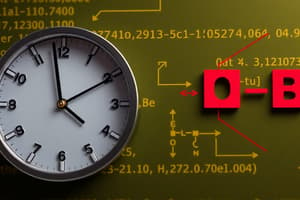Podcast
Questions and Answers
What does time complexity in DSA refer to?
What does time complexity in DSA refer to?
- How long it takes a program to run based on the size of its input (correct)
- Organizing data and finding solutions systematically
- Describing the upper bound of complexity using Big O notation
- The amount of memory an algorithm requires to run efficiently
Which notation describes the upper bound of time or space complexity?
Which notation describes the upper bound of time or space complexity?
- Big O Notation (correct)
- Complexity Notation
- Linear Notation
- Algorithmic Notation
If an algorithm's time complexity is 'O(n)', what does this imply?
If an algorithm's time complexity is 'O(n)', what does this imply?
- Time will increase linearly with input size (correct)
- Time will decrease as input size increases
- Time will be constant regardless of input size
- Time will be exponential with input size
What does space complexity in DSA specifically refer to?
What does space complexity in DSA specifically refer to?
In algorithm analysis, what does 'O(n)' represent?
In algorithm analysis, what does 'O(n)' represent?
Why is understanding time complexity crucial in DSA?
Why is understanding time complexity crucial in DSA?
What is the primary purpose of algorithm analysis?
What is the primary purpose of algorithm analysis?
What is the significance of time complexity in algorithm analysis?
What is the significance of time complexity in algorithm analysis?
What is the purpose of space complexity in algorithm analysis?
What is the purpose of space complexity in algorithm analysis?
Which notation is commonly used to express time and space complexities?
Which notation is commonly used to express time and space complexities?
Why is algorithm analysis important in computer science?
Why is algorithm analysis important in computer science?
What is the relationship between algorithm analysis and the design of new algorithms?
What is the relationship between algorithm analysis and the design of new algorithms?
Study Notes
Complexity in Data Structures and Algorithms (DSA)
Data structures and algorithms (DSA) are essential components of computer science. They help solve problems efficiently and effectively by organizing data and finding solutions in a systematic manner. In this article, we will discuss the concept of complexity in DSAs, focusing on time complexity, space complexity, and algorithm analysis.
Time Complexity
Time complexity refers to how long it takes a program to run, depending on the size of its input. It is a way of measuring how long it takes for an algorithm to complete its execution. For example, if we have an algorithm that runs in O(n) time complexity, where n represents the size of the input data, this means that the running time will increase linearly with the input size. Understanding time complexity is crucial because it helps us evaluate different algorithms based on their performance in various situations.
Big O Notation
Big O notation is a mathematical notation used to describe the performance or complexity of algorithms. It is a way of describing the upper bound of the time or space complexity of an algorithm. For example, if an algorithm's running time is described as O(n), it means that the running time will never be greater than cn, where c is a constant and n is the size of the input data.
Space Complexity
Space complexity refers to the amount of memory an algorithm requires to run efficiently. It is concerned with understanding how much storage space is needed for an algorithm to function correctly. Space complexity can be measured using big O notation just like time complexity. This allows us to compare different algorithms in terms of memory usage and determine which one uses less or more space for processing.
Algorithm Analysis
Algorithm analysis involves evaluating the efficiency of an algorithm by studying its time and space complexities. By analyzing the complexity of an algorithm, we can understand how the running time and space requirements change depending on the input size. This information is essential for selecting the most efficient algorithm for a given problem and for designing new algorithms that overcome limitations in existing ones.
In conclusion, complexity in DSAs plays a vital role in determining the performance of algorithms. Time complexity, space complexity, and algorithm analysis help us understand the scalability and efficiency of different algorithms and choose the best one for specific tasks. As computer science continues to evolve, the importance of these concepts in DSA will only grow, making a deep understanding of them indispensable for practitioners and researchers alike.
Studying That Suits You
Use AI to generate personalized quizzes and flashcards to suit your learning preferences.
Description
Explore the concept of complexity in Data Structures and Algorithms (DSA) including time complexity, space complexity, and algorithm analysis. Learn about time complexity in terms of Big O notation and how it impacts algorithm performance. Understand space complexity and its significance in evaluating an algorithm's memory requirements. Discover how algorithm analysis helps in selecting efficient algorithms based on their time and space complexities.




